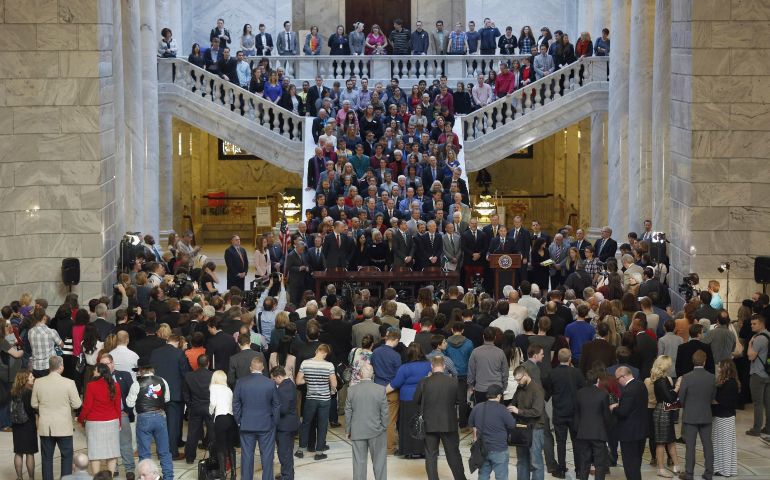
Utah Gov. Gary Herbert speaks March 12, 2015, at the state Capitol in Salt Lake City before signing a landmark anti-discrimination bill. Lawmakers passed the measure preventing discrimination based on sexual orientation while also protecting religious freedom. (CNS photo/Jim Urquhart, Reuters)
It is always difficult to discuss public opinion polls when it comes to what the positions of the church should be. We know the arguments: The church is not a democracy; the church cannot change its doctrine.
So with such recognition and trepidation in mind, let's take a look at a fairly recent Pew Research survey on religious liberty and discrimination.
I see this survey, in a sense, responding to the Catholic bishops in our country who have promoted a discussion of religious liberty tied to the Affordable Care Act. The bishops promoting this initiative have focused on making sure that contraceptive services are not mandated in health insurance packages. (Here is more from their side on why they resist the mandate.)
The Pew research data provides information that is probably not surprising. Only 4 percent of respondents see contraception as wrong. I wonder how many bishops are included in that 4 percent? Over 90 percet of participants see birth control as either morally unobjectionable or not even a moral issue.
Employers should be required to provide contraceptive coverage, according to two-thirds of respondents.
Catholic traditionalists will, of course, say, "Who cares," because morality is not determined by popular vote but by the law of God. A powerful argument, but what is the data telling us?
For one thing, I believe the data tells us the direction in which public opinion is moving. The other two issues covered in this survey are homosexual behavior and transgender use of public bathrooms. The numbers are less dramatic than with contraception. The public is split on whether businesses have to provide wedding services to gay couples. Forty-nine percent say they should be legally required, while 48 percent say they should not. Furthermore, 62 percent say homosexual behavior is morally acceptable or not a moral issue, while 35 percent do see it as wrong.
A total of 51 percent say transgender individuals should use the bathroom of the gender with which they identify. Forty-six percent say they should use restrooms of the gender into which they were born.
One in five adults say they have become more accepting of homosexual people in the past few years. Most know someone who is gay, and that has in most case influenced them in a positive manner. Fewer people have had direct contact with transgender individuals.
The most significant data point is that adults under the age of 30 are more accepting. For example, two-thirds of those under 30 believe transgender individuals should use the bathroom of the gender with which they identify.
The point here, which I believe is unassailable, is that public opinion is moving in the direction of greater acceptance. There is no indication that this direction will change in the future.
More and more, these issues are seen as issues of discrimination rather than morality. Perhaps it could be characterized as a live-and-let-live philosophy. More positively it might be seen as all of us having a right to our own beliefs and happiness as long as we are not bringing harm to others. Our Constitution guarantees freedom from religion as well as freedom of religion.
Where does that leave the institutional church? It certainly moves more to the margins of society. Its own members are in disagreement, especially on the issue of contraception. Church arguments on natural law have no resonance with the general population.
Should the church become a remnant insisting on purity of teaching? Some traditionalists seem to have already chosen this path. Is it possible, however, that the church may want to rethink its own position? Should some new categories or a different philosophical framework be brought to bear on this discussion?
One area where I would hope the bishops would reconsider their current thinking is on the issue of religious liberty. They have grossly distorted the American notion of religious liberty. If they would look carefully at what they have been saying, they could see that their demands for what they perceive to be their religious freedom rights involve denying the personal and religious liberty of those who disagree with them.
We know that infallibility works through the people of God as well as the pope and the hierarchy. On contraception, if not on other issues, it seems the people have spoken.




